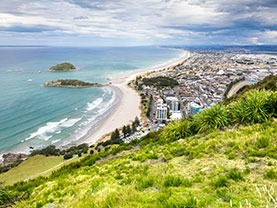
University of Auckland
Auckland, New Zealand
Program Facts
Program Type: Exchange
Credit Type: Transfer Credit
Terms Available: Academic Year , Calendar Year , Fall , Spring
GPA: 3.0
Class Eligibility: Junior , Senior , Sophomore
Program Open To: UA Students
Language of Instruction: English
Application Deadline: Fall, Academic Year: February 20 , Spring, Calendar Year: September 10
Coordinator: Vasilis Kokkinos
Explore University of Auckland
This program is anticipated to return in Fall 2024. Until then, please consider one of our other exchange programs in Oceania.
Contact studyabroad@arizona.edu with questions.
University of Auckland, located in the heart of Auckland on the North Island, is New Zealand's top-ranked university, leading the world in research across a variety of disciplines. Auckland is home to one of the largest library collections in New Zealand. Students may also take advantage of the more than 120 student clubs and societies. Take a virtual tour of campus here!
View the University's helpful academic guide for international students , and view Auckland's full course catalog.
Students must enroll in 50 points per semester.
New Zealand Education offers scholarships for international students wishing to study abroad at the University of Auckland.
Other scholarships:
Arizona International scholarships:
Departmental scholarships:
- Ask your academic advisor about scholarships, awards, and grants offered through your department!
- Honors College study abroad scholarships
External scholarships:
- Gilman Scholarship (for Pell Grant recipients)
- Fund for Education Abroad
Expand the sections below to view pre-approved courses at the University of Auckland. This list is not exhaustive- browse the course catalog linked above for a full selection of class offerings during your term abroad.
Fall Courses
Anthropology
Archaeology: Understanding the Past
An examination of current concepts in archaeological research and their place in the development of archaeological thought. How archaeology makes use of its methods and theories to understand the past. An introductory laboratory component.
Art History
Understanding Art: Leonardo to Warhol
Is seeing learned? Can an image be read in the same way as a text? Understanding images is central to everyday life. Visual literacy is fundamental to all disciplines. This course provides students with tools for making sense of various kinds of images and objects: photographs, advertisements, paintings, film, television, comics, cartoons, monuments, buildings, maps, landscape, digital and internet images.
Astronomy
Planets, Stars, and Galaxies
The story of our place in the Universe. Key topics are the exploration of the solar system, searches for planets around other stars, the structure and evolution of stars and galaxies, high-energy astrophysics, and the origin and overall properties of the Universe. No background in physics or mathematics is assumed.
Biology
Genetics
The basic principles of mutation, recombination and genetic mapping are established in this course. These principles are developed in a variety of prokaryotic and eukaryotic organisms. Laboratory work uses molecular, microbial and eukaryotic material to explore the key features of heredity.
Business
Accounting Concepts
Basic principles and concepts of accounting that underlie the production of information for internal and external reporting. This course provides the technical platform for second year courses in financial and management accounting, finance, and accounting information systems.
Business Across Borders
Business on a global scale presents unique challenges and unrivaled opportunities to companies equipped to cross national boundaries. Set against a background of current events, the course explores the influence of international trade and multinational corporations on the contemporary global economy.
Business Systems
Explores how information systems and operations management help organisations to innovate, optimise and deliver value. Examines how the interaction of business, systems, and technologies bring about organisational transformation. Develops the ability to conduct a business analysis of an organisation's vision, industry, strategy, value chain, processes, and systems.
Consumer Behavior
Focuses on understanding customers. Applies psychology to how people make consumption decisions and interpret advertising. Includes a consideration of individual differences and environmental/situational influences on consumers.
Contemporary Marketing
A comprehensive overview of the central principles and concepts of marketing management. Highlights the challenges that marketing managers face in planning and implementing effective marketing mix strategies.
Financial Management
Focuses on practical aspects of corporate finance. Topics covered include: concepts of value creation, risk and required rates of return, financial maths, capital budgeting, capital structure and dividend policies.
Introduction to Investments
Markets for shares, fixed income securities, options and futures. Methods of valuing shares, fixed income securities, options, and futures. Simple techniques of hedging risk. Portfolio diversification. Portfolio evaluation.
Introduction to Operations and Supply Chain Management
An introduction to important decision areas in operations and supply chain management. Modelling and analytical skills will be developed and supporting techniques/tools will be introduced using spreadsheets. Common qualitative and quantitative aspects of supply chain management will be discussed.
Macroeconomics
Provides an introduction to the dynamic microfoundations of macroeconomics, and demonstrates how we can utilise these foundations (i) to understand the trends and fluctuations of macroeconomic aggregates like national output, unemployment, inflation and interest rates, and (ii) to predict the outcome of alternative government policies related to current economic problems of New Zealand and the rest of the world..
Microeconomics
Study of the allocation of scarce resources among competing end uses. Intermediate-level analysis of the economic behavior of individual units, in particular consumers and firms. Although the focus is on perfectly competitive markets, attention is also given to other types of markets. Analysis also includes concepts of expected utility and uncertainty, and welfare economics.
Understanding Organizations
Explores organisations, different types and forms, and the issues that they need to consider. Questions the role and purpose of organisations within broader social systems. Begins to develop critical approaches and skills in organisational analysis.
Understanding the Global Economy
Economics affects our daily lives and the global environment in many ways. Through the media we are constantly made aware of price increases, interest rate changes, exchange rate movements and balance of payments problems, growth and recessions, standard of living comparisons, regional trading agreements. What does it all mean and how does it all work?
Understanding Work and People
Models of work organisation, reform and performance, including industrial and post-industrial forms of work. Employee responses to work and the employment relationship. Workforce diversity.
Chemistry
Chemistry of the Living World
A foundation for understanding the chemistry of life is laid by exploring the diversity and reactivity of organic compounds. A systematic study of reactivity focuses on the site and mechanism of reaction including application of chemical kinetics. A quantitative study of proton transfer reactions features control of pH of fluids in both living systems and the environment.
Chemistry of the Material World
The chemistry of the elements and their compounds is explored. The relationship between molecular structure and reactivity, the role of energy, concepts of bond formation and chemical equilibrium are discussed. Issues such as sustainability, energy and fuels, and the creation of new materials are also discussed
Communication
Communication, Technology, and Culture
Explores the past, present and future of communication media. Examines communication media within their social context, and provides a particular focus on the interplay between technology and culture. Key concepts in the study of communication are introduced and various communication media are studied via specific case studies, with particular emphasis placed on new digital platforms including social and mobile media as well as older forms such as television and cinema.
Social Media
Addresses issues related to the use of social media and considers in particular the influence of new media corporations such as Facebook, as well as platforms like Twitter, SnapChat, Tinder and YouTube. Explores our cultural practices and social rituals in relation to these peer-to-peer, one-to-many media technologies, and examines this revolution in the media landscape.
Computer Science
Introduction to Computer Systems
An introduction to the various layers that make up a modern computer system: encoding of data and instructions, hardware, low-level programming, operating systems, applications and communications.
Introduction to Practical Computing
A practical introduction to computing. Topics include: web design, an overview of computer hardware and operating systems, effective use of common applications, using the internet as a communication medium, applying programming concepts, and social implications of technology.
Introduction to Software Fundamentals
Fundamental programming techniques and processes, such as conditionals, iteration, recursion, functions, testing and debugging. Efficient ways to organise and manipulate data, including sorting and searching algorithms. Writing software that uses and implements common abstract data types such as lists, stacks, queues, dictionaries and trees.
Principles of Programming
An introduction to computers and computer programming in a high-level language. The role of computers and computer professionals in society is also introduced. The course is intended for students who may wish to advance in Computer Science or in Information Systems and Operations Management.
East Asian Studies
Images of Asia
An interdisciplinary introduction to the histories and cultures of East Asian societies, exploring their development, their engagement with each other over time, and what makes them the societies that they are today.
New Zealand and Asia
Explores Asia and its interrelationship with New Zealand, including Asia's growing presence in New Zealand in all its manifestations, and the evolving political, social, economic, cultural, and strategic relations between this country and Asia. Topics will include historical and contemporary ties with Asia, Asian migration, literature, media and films. The course will focus especially on South-East and East Asia.
Economics
Nutritional Science
The scientific basis of nutrition focusing on its biochemistry and physiology in health and disease. Nutritional aspects of carbohydrates, fats, proteins, vitamins and trace nutrients are covered in an integrated manner. The methodologies which underpin nutritional science and its applications are included. Reference will be made to a broad range of examples, and a number of specific nutritional topics of current interest will also be included.
Environmental Science
Environment, Science, and Management
Explores the science behind key environmental issues to recognise the role environmental science plays in understanding the interaction between humans and the environment. The complexity of environmental problems and the difficult task of integrating science, knowledge and values are discussed.
Environmental Science, Risk, and Society
An examination of the contemporary topics that shape the ways in which environmental science may be communicated and understood. Topics of discussion include issues of scientific uncertainty, risk communication, public trust and the role of media.
Film & Television
Film Studies
An introduction to the feature film and the main traditions of film criticism. A series of significant films, from 1915 to the present, are explored in detail. The aim is to develop a historical perspective, an awareness of film-making as an art and an interest in the relationship between films and society, including debates about race, gender, censorship.
Food Studies
Introduction to Wine Science
An introduction to grape growing and wine. Topics covered include history of wine, geography and terroir, grape growing, winemaking technology, microbiology, sensory evaluation, and health considerations of wine. A special emphasis on grape growing and winemaking in New Zealand.
Gender and Women's Studies
Gender, Sex, and Commodification
Focuses on current and controversial issues at the intersections of sex and gender and their co-construction. Issues will be approached from contemporary feminist and queer theory perspectives. Various topics are critically examined in both theoretical and practical terms, such as co-constructions of gender and sexualities in pornography and advertising, technologies and reproduction, representations of transgender bodies/identities, and the selling of cybersex.
Geography & Development
Cities and Urbanism
What makes a great city? This course explores 'urbanism' in both historical and contemporary cities to determine the essence of urbanity and the way that citizens (and visitors) experience city life. The dynamics and character of cities are considered in terms of their built environment, environmental systems, population, social diversity, and planning policies and practices.
Earth Surface Processes and Landforms
Understanding of the functioning of natural systems at the Earth's surface and human interactions with these systems. Examines the operation and interaction between Atmospheric, Hydrological, Ecological and Geomorphic systems. Environmental processes are an integrating theme. Topics include: climate and hydrological systems, ecological processes; surface sediment cycle; and processes governing development and dynamics of major landform types.
Environment and Society
A critical exploration of the interconnectedness of environment and society. The course highlights the importance of understanding how different views and attitudes influence people's interactions with the environment. Key themes include governance, management and development, which are addressed through issues such as conservation, climate change adaptation, disasters and resource use. Classes draw on a variety of case studies from New Zealand and overseas.
Geosciences
Antarctica: The Frozen Continent
A general introduction to Antarctica and its environs including the Southern Ocean and the sub-Antarctic islands. Emphasis will be placed on the evolution of Antarctica and how resident plants, animals and micro-organisms have adapted to cope with the extreme environment. Specific topics to be addressed include: the history of Antarctic exploration and its impact on the development of Antarctic science, Antarctic ecosystems, Antarctica as a wilderness region, and the impact of humans including the exploitation of resources and the effects of pollution. This course is suitable for students with both science and non-science backgrounds.
Foundations for Earth Sciences
Exploring and understanding the complexities of Earth systems requires earth scientists to engage with a range of quantitative techniques and tools. Introduces students to contemporary approaches for analyzing and interpreting earth science data. Covers mathematical, physical, computational, and chemical methods used in the earth sciences. Emphasizes practical application to a variety of earth science topics.
Global Studies
Polynesian Warriors: Sport and Pacific Cultures
Sport has profoundly impacted Pacific peoples and cultures, playing critical roles in colonialism and education in the past, to migration and commercialisation in the present. Sport has changed Pacific cultures and been changed by Pacific cultures. Pacific cultural encounters with globalisation, race, capitalism, migration and public discourse will be explored through the experience of sport.
The Contemporary Pacific
Explores the ways in which Pacific peoples frame their contemporary world in the context of globalisation. It also examines factors which shape contemporary Pacific life and popular culture as well as some of the challenges emanating from how Pacific peoples construct and make sense of their own and others’ historical, political, socio-cultural, economic and religious worlds.
History
New Zealand Cultural History
An introduction to changing ideas about New Zealand and New Zealand culture from colonial times to the present considering, among other topics, the history of exploration and travel, the iconography of the nation, public and private commemorations and celebrations, the history of the body and the commercialisation of leisure.
Pacific History: An Introduction
A survey of the history of the Pacific from 1000 to the present. Includes indigenous histories, colonization and post-colonization, cross-cultural encounters, warfare, and environmental change.
Information Science
Video Games: Theory and Culture
A study of video games as a new media form situated in the broader context of media theory and history. Considers video gaming as an industry, as a leisure activity, and as a site of aesthetic and narrative innovation. The course examines what makes video games a distinctive media form.
Linguistics
Introduction to Linguistics
An introduction to the main areas of linguistics: the production and function of sounds in language (phonetics and phonology), word structure and word formation (morphology), the principles of grammar through a study of sentence structure (syntax), and various aspects of meaning (semantics). The course is a self-contained introduction and assumes no prior knowledge of linguistics or language study.
Nutritional Science
Exercise Nutrition
A cross-disciplinary focus on nutrition, examining nutritional enhancement of sports performance, diet and physiological function, eating disorders, energy balance, body composition and the role of diet in growth and exercise.
Foundations of Food and Nutrition
Introduces students to the multifaceted nature of Food Science and Nutrition with a focus on the interplay between food, nutrition and health. Introduce the chemical, biological, sensory, and processing aspects of foods. Societal, economic, legislative and regulatory aspects will also be introduced. Concepts will be illustrated using real food systems with a focus on lipids, water and vitamin C.
Philosophy
Ethics and Justice
How should we live? And how do we live well together? This course examines practical questions of ethics and justice at the personal, professional, social and global levels. The course reflects on these topics in the light of philosophical theories about justice, liberty, rights, and different approaches to ethics that emphasise roles, rules, virtues and consequences.
Introduction to Logic
Logic is the study of argument. This course aims to provide an understanding of central logical notions, such as consistency and inconsistency, logical truth, and, most importantly, what it means for an argument to be valid or invalid, sound or unsound. The course examines two main logical systems, propositional and predicate logic, and shows how these formal systems are used to analyse and evaluate arguments.
Philosophy of Religion
A study of the relationship between reason and faith; is belief in the Judaeo-Christian God reasonable? Topics include: the problem of evil, the meaningfulness of religious language, alternative concepts of God, Hume on miracles, and Kierkegaard and William James on faith and reason.
Political Science
Global Politics
An introduction to the study of international relations. The focus is on how international organisations, states and non-state actors raise and address global challenges such as security and human insecurity, humanitarian intervention, global trade and finance, development and poverty, environmental degradation, warfare, and respect for human rights. The course is informed by and introduces a range of international relations theories.
New Zealand Politics
An introduction to understanding who governs New Zealand and in whose interests. Topics include national identity, institutions of government, leadership, voting and elections, the place of Māori within the political system, parties and political participation. The course draws on current research in NZ politics and provides knowledge that can be applied to a variety of careers, including law, business and public service.
Psychology
Human Neuroscience
Covers material relating to the neural basis of cognitive processes, including perception, attention, memory and language. Students will be introduced to different methods of inferring mind-brain relations in normal and neurologically-impaired individuals, and different ways of conceptualizing mind-brain relations, such as connectionism and modularism.
Individual, Social, and Applied Psychology
Topics covered may include: developmental and social psychology including group behaviour, the measurement of mental abilities, intelligence, models of personality, clinical and health psychology, methods of therapeutic intervention, and the psychological similarities and differences between cultures. A laboratory component, in which students are required to participate as subjects, forms part of the course.
Mind, Brain, and Behavior
Topics covered may include: the nature of sensory and perceptual processes, the cause of perceptual illusions, the structure and function of the human brain, approaches to animal and human learning, models of human language and memory, and the design of psychological experiments. A laboratory component, in which students are required to participate as subjects, forms part of the course.
Perception and Cognition
An introduction to a variety of topics in human experimental psychology. Topics covered may include: perceptual processes, attention, memory, mental imagery, language development, theory of mind, problem solving and decision making. Participation in the laboratory component of this course is compulsory.
Social Psychology
Focuses on humans as social beings. Covers topics such as social cognition, attitudes, group processes, interpersonal relationships, and language communication. The course may include participation in and completion of a research project.
Public Administration
Social Policy Development
Explores the design and analysis required in policy advocacy and policy development. Consideration of the contexts where policy review and development occur, the procedures involved, the role and preparation of submissions outlining a case for change and the proposal for new policy, and the obligations required in policy innovation and evaluation.
Sociology
Cultural Criminology
Exposes students to the major concepts and methodological approaches within cultural criminology, a field that is unique in its exploration of the meanings associated with crime and deviance. The course also considers the broader contexts of crime, how powerful groups and media influence criminal justice policies, and the relationship between popular discourses and the nature of social control.
Environmental Sociology
Environmental sociology provides insight into the complex social processes that define, create and even threaten our natural environment. This course gives tools with which to think sociologically about environmental issues, such as understanding how environmental issues come to be seen as environmental problems, and how political, cultural, and economic factors have come to shape our interaction with the natural environment.
New Zealand Social Policy and Social Justice
Provides an overview of key contemporary social policy issues within the context of globalising economic processes and continuing gendered and racialised divisions. Discusses the way in which debates around social policy are constructed and the implications this has for social justice. Case studies may include food and health, technology, indigeneity and children.
Understanding Aotearoa New Zealand
Provides an introduction to the sociological analysis of New Zealand society. Looks at familiar events, institutions, social processes from a sociological point of view and offers ways to understand them in new and different ways. Focuses on the structure of New Zealand society and on social and political changes which affect the lives of New Zealanders and shape their society.
Sustainable Build Environments
Sustainability and Us
What is sustainability? Discussion of what ‘sustainability’ means, its underpinning values, and the role individuals and organisations play in creating solutions. Students work in groups to investigate a sustainability issue on campus and design a solution, which they present via a film, poster, presentation or model. Examines sustainability issues - water and overpopulation.
Spring Courses
Anthropology
Human Cultures: Introduction to Social Anthropology
Humans are social and cultural beings. This course provides an understanding of human lives. Basic concepts and approaches are covered.
Art
Comics and Visual Narrative
Explores the medium of comics both as an expression of popular culture and as a visual language. Beginning with a history of sequential graphic narrative, the course considers issues around the legitimacy of a popular art form and means of story-telling, as well as the problem of censorship that dominated comics culture especially in the 1950s.
Art History
Global Art Histories
A broad survey of visual art spanning from the early modern period to the contemporary. Students will be introduced to a range of art practices situated within a global context and will consider art works produced in Māori and Pacific cultures alongside Indian, Asian, Middle Eastern, European and American traditions.
Astronomy
Planets, Stars, and Galaxies
The story of our place in the Universe. Key topics are the exploration of the solar system, searches for planets around other stars, the structure and evolution of stars and galaxies, high-energy astrophysics, and the origin and overall properties of the Universe. No background in physics or mathematics is assumed.
Biology
Cellular and Molecular Biology
A general introduction to Antarctica and its environs including the Southern Ocean and the sub-Antarctic islands. Emphasis will be placed on the evolution of Antarctica and how resident plants, animals and micro-organisms have adapted to cope with the extreme environment. Specific topics to be addressed include: the history of Antarctic exploration and its impact on the development of Antarctic science, Antarctic ecosystems, Antarctica as a wilderness region, and the impact of humans including the exploitation of resources and the effects of pollution. This course is suitable for students with both science and non-science backgrounds.
Principles of Microbiology
An introduction to the diversity, physiology and functions of microorganisms (prokaryotes, eukaryotes, viruses) as individuals and as communities. The fundamental roles of microorganisms in ecosystems, health and disease are considered alongside methods for their isolation and study. Microbial applications in biotechnology, food production, agriculture and industry are also discussed.
Business
Accounting Concepts
Basic principles and concepts of accounting that underlie the production of information for internal and external reporting. This course provides the technical platform for second year courses in financial and management accounting, finance, and accounting information systems.
Business Systems
Explores how information systems and operations management help organisations to innovate, optimise and deliver value. Examines how the interaction of business, systems, and technologies bring about organisational transformation. Develops the ability to conduct a business analysis of an organisation's vision, industry, strategy, value chain, processes, and systems.
Consumer Behavior
Focuses on understanding customers. Applies psychology to how people make consumption decisions and interpret advertising. Includes a consideration of individual differences and environmental/situational influences on consumers.
Contemporary Marketing
A comprehensive overview of the central principles and concepts of marketing management. Highlights the challenges that marketing managers face in planning and implementing effective marketing mix strategies.
Essential Marketing
Introduces fundamental marketing ideas and skillsets. Explores the world of customer value creation and marketing communications through the eyes of marketing and creative experts. Covers current topics in marketing including digital and social media, social entrepreneurship, big data analytics, green marketing and sustainability.
Financial Management
Focuses on practical aspects of corporate finance. Topics covered include: concepts of value creation, risk and required rates of return, financial maths, capital budgeting, capital structure and dividend policies.
Introduction to Investments
Markets for shares, fixed income securities, options and futures. Methods of valuing shares, fixed income securities, options, and futures. Simple techniques of hedging risk. Portfolio diversification. Portfolio evaluation.
Introduction to Operations and Supply Chain Management
An introduction to important decision areas in operations and supply chain management. Modelling and analytical skills will be developed and supporting techniques/tools will be introduced using spreadsheets. Common qualitative and quantitative aspects of supply chain management will be discussed.
Macroeconomics
Provides an introduction to the dynamic microfoundations of macroeconomics, and demonstrates how we can utilise these foundations (i) to understand the trends and fluctuations of macroeconomic aggregates like national output, unemployment, inflation and interest rates, and (ii) to predict the outcome of alternative government policies related to current economic problems of New Zealand and the rest of the world..
Microeconomics
Study of the allocation of scarce resources among competing end uses. Intermediate-level analysis of the economic behavior of individual units, in particular consumers and firms. Although the focus is on perfectly competitive markets, attention is also given to other types of markets. Analysis also includes concepts of expected utility and uncertainty, and welfare economics.
Understanding Organizations
Explores organisations, different types and forms, and the issues that they need to consider. Questions the role and purpose of organisations within broader social systems. Begins to develop critical approaches and skills in organisational analysis.
Understanding the Global Economy
Economics affects our daily lives and the global environment in many ways. Through the media we are constantly made aware of price increases, interest rate changes, exchange rate movements and balance of payments problems, growth and recessions, standard of living comparisons, regional trading agreements. What does it all mean and how does it all work?
Understanding Work and People
Models of work organisation, reform and performance, including industrial and post-industrial forms of work. Employee responses to work and the employment relationship. Workforce diversity.
Chemistry
Chemistry of the Living World
A foundation for understanding the chemistry of life is laid by exploring the diversity and reactivity of organic compounds. A systematic study of reactivity focuses on the site and mechanism of reaction including application of chemical kinetics. A quantitative study of proton transfer reactions features control of pH of fluids in both living systems and the environment.
Chemistry of the Material World
The chemistry of the elements and their compounds is explored. The relationship between molecular structure and reactivity, the role of energy, concepts of bond formation and chemical equilibrium are discussed. Issues such as sustainability, energy and fuels, and the creation of new materials are also discussed
Concepts in Chemistry
The fundamentals of chemistry are explored with a view to enhancing understanding of the chemical nature of the world around us and providing a foundation for further study in chemistry. Special attention is paid to familiarization with the language of chemistry and the chemist's perspective of the properties of matter and its transformations.
Communication
Advertising and Society
A critical examination of advertising and advertisements focusing on the role advertising plays in consumer culture. Advertisements from a diverse range of media are studied in order to analyse how advertisements construct and disseminate meaning. The course investigates how advertising engages with the logic of wider cultural and global transformations with consideration given to both consumer and industry perspectives.
Gender, Politics, and the Media
Addresses the theory, practice and representation of politics in the media from a gendered perspective. Analyses the relationship between the media and women and men in the public sphere.
Intercultural Communication
Examines intercultural competence and communication in the context of the contemporary transnational movement and interactions of people, practices and products. Students are introduced to the concepts, ideas, and frameworks necessary for critically reflecting on cultural differences and perceptions, and on the impact of migration and multiculturalism on communication across cultures.
Sports Media
Examines the relationship between sport and the media. Topics include sports journalism; industry practice; the mediated game event; online communities of fandom; commentary; issues of race and gender; and sports law. Students have the opportunity to experience outside broadcast of televised sport and use the university television studio to engage with key media sport professionals.
Visual Communication
Provides students the tools for communicating with various kinds of visual images and objects. These may include brands, logos, graphics, photographs, advertisements, promos, paintings, cartoons, maps, architecture and architectural diagrams. Students will interrogate their culturally specific visual competencies and refine their skills in visual literacy while addressing issues of textuality, identity, ethnicity, nation, class, gender, and communicative inter-relationships more generally.
Computer Science
Introduction to Computer Systems
An introduction to the various layers that make up a modern computer system: encoding of data and instructions, hardware, low-level programming, operating systems, applications and communications.
Introduction to Practical Computing
A practical introduction to computing. Topics include: web design, an overview of computer hardware and operating systems, effective use of common applications, using the internet as a communication medium, applying programming concepts, and social implications of technology.
Introduction to Software Fundamentals
Fundamental programming techniques and processes, such as conditionals, iteration, recursion, functions, testing and debugging. Efficient ways to organise and manipulate data, including sorting and searching algorithms. Writing software that uses and implements common abstract data types such as lists, stacks, queues, dictionaries and trees.
Principles of Programming
An introduction to computers and computer programming in a high-level language. The role of computers and computer professionals in society is also introduced. The course is intended for students who may wish to advance in Computer Science or in Information Systems and Operations Management.
Ecology & Evolutionary Biology
Principles of Ecology
An examination of ecosystem processes, factors that affect distribution and interactions of organisms, population ecology, and applications of ecology such as restoration and conservation. The key principles of ecology are taught in a New Zealand context emphasizing an experimental approach.
Principles of Marine Science
An introduction to the physical and biological structure of the oceans, sea floor, coastlines and the biological communities that inhabit them. Subject matter includes an overview of the nature and scope of marine science globally and within the New Zealand and Auckland contexts. A wide coverage of marine science issues are presented with an emphasis on multidisciplinary examples. No formal prerequisite, although an understanding of Stage I level science is assumed.
The Oceans Around Us
An interdisciplinary approach to understanding the importance of our oceans as the driver of our climate, source of sustenance, and focus of domestic and international political, economic and legal negotiations. It is framed around physical and biological processes in the ocean which raise questions for ocean management in NZ and internationally, allowing real-world debate about the future of the ocean realm.
Environmental Science
Environment, Science, and Management
Explores the science behind key environmental issues to recognise the role environmental science plays in understanding the interaction between humans and the environment. The complexity of environmental problems and the difficult task of integrating science, knowledge and values are discussed.
Film & Television
Watching Television
Explores the historical development and distinctive aesthetic style of television; examines television’s role in the production of individual, national and global identities; and interrogates television’s negotiation of social meanings in the context of everyday life. Specific topics include domestic context; audience reception and negotiation; fandom and celebrity; the regulation of childhood; commodity culture and tabloid television.
Food Studies
Introduction to Wine Science
An introduction to grape growing and wine. Topics covered include history of wine, geography and terroir, grape growing, winemaking technology, microbiology, sensory evaluation, and health considerations of wine. A special emphasis on grape growing and winemaking in New Zealand.
Gender and Women's Studies
Gender: Global and Local
Develops an understanding of key concepts that underlie gender analysis, and how they are expressed in politics, culture and society. Examines the meaning of gender across a range of subjects and issues on the global stage and in our everyday lives.
Geography & Development
Earth Surface Processes and Landforms
Understanding of the functioning of natural systems at the Earth's surface and human interactions with these systems. Examines the operation and interaction between Atmospheric, Hydrological, Ecological and Geomorphic systems. Environmental processes are an integrating theme. Topics include: climate and hydrological systems, ecological processes; surface sediment cycle; and processes governing development and dynamics of major landform types.
Introduction to Urban Planning
An introduction to the city, urban planning and sustainability; professional roles, practices and ethics.
Urban Geography
Analysis of key processes shaping socio-cultural geographies of contemporary cities. Using international and local examples, issues such as the economy of cities, the culture of cities, home and housing, segregation and polarization, the imaging of cities and sustainability are explored.
Geosciences
Natural Hazards in New Zealand
New Zealanders are exposed to extreme natural events and processes including earthquakes, volcanic eruptions, weather bombs, storm surge, tsunami, flooding, landslides and erosion. The physical context for each hazard is provided, drawing on the disciplines of geology, geomorphology and climatology. The frequency and magnitude of natural hazards for New Zealand are considered using different sources. Impacts on modern society are discussed using case studies and scenario modelling.
New Zealand; Half a Billion Years on the Edge
Take a 500 million year journey through time following the geologic and biologic development of New Zealand from humble beginnings on the edge of the ancient supercontinent Gondwana to the present day geologically dynamic land mass beset by volcanic eruptions, earthquakes and massive erosion as a consequence of being located on the edge of the Earth's largest tectonic plate.
Global Studies
Introduction to Pacific Studies
Introduces students to the discipline of Pacific Studies, framed by Pacific ways of knowing and doing and the expression and understanding of Pacific cultures. Topics covered include: health and wellbeing, ethnic and gender identities, spirituality, history, politics, sports and society, languages, performing arts, leadership and innovation and sustainability.
History
Bloodlands: Global Warefare
Asks historical questions about warfare in the modern era. Analyses conflicts and state violence and their impacts on people and their governments in a global setting. Themes include: the causes, course and consequences of warfare; restraint in warfare; ideologies of war and peace; civil war and revolution; imperial warfare; genocide; the human impact and context of war.
Global History
It is only since the fifteenth century that a truly global dimension to history can be identified. This course examines key determinants that have bound the fate of peoples together including the emergence of world trade networks, the growth of world religions, the spread of epidemic diseases, the formation of empires, and the migration of peoples across continents.
Linguistics
Introduction to Linguistics
An introduction to the main areas of linguistics: the production and function of sounds in language (phonetics and phonology), word structure and word formation (morphology), the principles of grammar through a study of sentence structure (syntax), and various aspects of meaning (semantics). The course is a self-contained introduction and assumes no prior knowledge of linguistics or language study.
Language Change
Introduces long-term historical trends, types of language change, language families and comparative reconstruction.
Language, Mind, and Society
A survey of three areas: the interaction between language structure and use on the one hand, and social structure and social norms on the other (sociolinguistics); the relationship between linguistic and cultural knowledge (anthropological linguistics); and the inter-relationship of language and other cognitive structures, especially as it is revealed through language acquisition (psycholinguistics).
Phonetics and Phonology
Includes a survey of speech sounds in the world's languages, an overview of speech production and perception, and an introduction to how these sounds are organised into language. Includes a practical component in which theories are applied to language data.
Syntax
Continues on from LINGUIST 100 or 103 and consists of a formal and a functional part, providing problems and exercises in syntactic analysis, as well as an introduction to grammatical theories and types of grammatical system.
Nutritional Science
Food Composition and Nutrition
Covers the composition and structure of food. The approach will extend the FOODSCI 100 content from lipids to proteins, carbohydrates and key minor food components. There will be a focus on the molecular structure of the major food components and how they relate to the physical, sensory and nutritional properties of foods.
Philosophy
Introduction to Logic
Logic is the study of argument. This course aims to provide an understanding of central logical notions, such as consistency and inconsistency, logical truth, and, most importantly, what it means for an argument to be valid or invalid, sound or unsound. The course examines two main logical systems, propositional and predicate logic, and shows how these formal systems are used to analyse and evaluate arguments.
Physics
Basic Concepts of Physics
An introduction to the basic principles of physics. Key topics are the physical description of motion, electricity and magnetism. The course focuses on the science of everyday phenomena and the understanding of important physical concepts.
Psychology
Biopsychology
Provides a basic introduction to the structure and function of the brain, neuropsychology, and genetic and hormonal influences on behaviour. This course includes a compulsory laboratory component.
Individual, Social, and Applied Psychology
Topics covered may include: developmental and social psychology including group behaviour, the measurement of mental abilities, intelligence, models of personality, clinical and health psychology, methods of therapeutic intervention, and the psychological similarities and differences between cultures. A laboratory component, in which students are required to participate as subjects, forms part of the course.
Life Span Development
The development of people across the life span is studied. Describes key milestones in development and examines the causes and processes that produce stability and change in people's development over time. Topics discussed will include aspects of cognitive, social and physical development with consideration given to biological, societal and family influences. Attention will also be given to development within the New Zealand context.
Mind, Brain, and Behavior
Topics covered may include: the nature of sensory and perceptual processes, the cause of perceptual illusions, the structure and function of the human brain, approaches to animal and human learning, models of human language and memory, and the design of psychological experiments. A laboratory component, in which students are required to participate as subjects, forms part of the course.
Psychology of Communication
Studies the links between psychological processes and communication disorders. Hearing and speech and language development will be covered. A range of communication disorders will be introduced. Psychosocial aspects of communication disorders including impact on self-esteem, health-related quality of life, peer/interpersonal relationships and educational and behavioural consequences of communication disorders in children will also be discussed.
The Social Work Environment
An introduction to the history and practice of social work and the wider policy environment that will be encountered while working in the profession. Examination of the roles played in the profession and familiarisation with traditions of care and policies of welfare that influence the work of social workers and social services.
Theories of Personality and Development
The major personality theories are presented including: Behavioural, Cognitive, Social-Cognitive, Psychodynamic, Humanistic/Phenomenological, Trait/Dispositional and Biological/Evolutionary. The hypotheses generated by these theories, about development from early childhood onwards and about 'normal' and 'abnormal' behaviour, will be discussed and evaluated in terms of empirical evidence and utility. Attention will be paid to cultural issues of relevance in a New Zealand context.
Sociology
Contemporary Issues in Punishment
The focus is on contemporary issues in punishment, considering both its purposes and effectiveness. The course explores a range of perspectives drawing on longstanding criminological, sociological and philosophical literatures.
Cultural Studies and Society
A cultural studies approach to social life focuses on the way we experience the world, taking account of what we see, what we hear, what we consume and how we communicate. Sociological theory will be explored through investigating different cultural forms including film, advertising, art, social media, sport, and video games.
Debates in Criminology
Presents analysis of criminal behaviour, crime control and community safety. Attention is paid to criminal offending, response and regulation. Examples are drawn from New Zealand and overseas.
Debates in Criminology
Presents analysis of criminal behaviour, crime control and community safety. Attention is paid to criminal offending, response and regulation. Examples are drawn from New Zealand and overseas.
Issues and Themes in Sociology
Introduction to sociology as a discipline and a review of some of its internal debates. Topics include: social class, gender, globalization, power, sexual identity and family. Draws on material from a range of societies.
Sociology for Human Services
Introducing the traditions of sociological analysis and its application to the human services. Key theory and theorists, the history of ideas and debates within sociology, and their relevance to practitioners' understanding of contemporary New Zealand society will be explored. A central theme is that a critical sociological imagination is essential for practitioners in social service settings.
Sociology of Health, Illness, and Medicine
Presents a conceptual and topical overview of the Sociology of Health, Illness, and Medicine. Specific topics to be addressed include: the social distribution of disease; the social production of disease; the social construction of 'illness'; the social construction of treatment practices; patient experiences of illness and healthcare; the social organisation of medicine; and alternative visions of healthcare.
Sociology of Violence and Death
Drawing on writings from a variety of intellectual traditions, this course explores the contested nature of violence through an examination of a number of contemporary debates about the causes, agents, consequences, as well as responses to and interventions in, incidents of violence..
Location: Auckland, New Zealand
New Zealand (population: 3 million) is situated in the southern waters of the Pacific Ocean, and is celebrated for its breath-taking scenery ranging from sparkling beaches to majestic mountain ranges and fjords. New Zealand has a temperate climate and four seasons: summer (December to February), autumn (March to May), winter (June to August), and spring (September to November).
Auckland is New Zealand's largest city, with a wider population of just over a million, and as a harbor city with a mild climate, provides opportunities to pursue all sorts of water sports and explore the many surrounding islands. The city is also a center for the arts and entertainment; the University's own Maidment Arts Centre offers a wide variety of professional performance, including theater, dance and music.
Learn more about Auckland !
Good to Know:
LGBTQ+ Equality Index rating: New Zealand rates 77/100 (with 100 being the most equal) on Equaldex’s LGBTQ+ Equality Index.
Global Peace Index rating: New Zealand ranks 4/163 in the Global Peace Index. The lower the score, the more peaceful the country.
Languages spoken: English, Maori (both official)
Housing:
Auckland guarantees University accommodations for all incoming exchange students. Click here for an overview of all available housing types.
Auckland:
- Study Abroad & Exchange homepage
- Exchange Program application instructions - your Coordinator will walk you through this!
- University of Auckland's YouTube channel
- Student life at Auckland
- Auckland's 'Support and wellbeing' page
- International student support
- AUSA's Buddy Program
- Information on orientation for international students
- Next steps for newly admitted students- your Coordinator will walk you through this!
New Zealand:
- Student visa application instructions from the University of Auckland
This program is anticipated to return in Fall 2024. Until then, please consider one of our other exchange programs in Oceania.
Contact studyabroad@arizona.edu with questions.
Semester Dates
- Please check the University of Auckland Academic Calendar for the most accurate program dates.
Semester Cost
- $50 Study Abroad Application Fee
- Mandatory Geo Blue International Health Insurance at a rate of $3 a day (approximately $360 a semester)
- You pay Main Campus UArizona Tuition & Fees to do an exchange and receive all of the financial aid you use on main campus.
- To learn more about how financial aid is applied to studying abroad, please see the official OSFA website.
- Other estimated costs include but not limited to housing, transportation (air & local), visa, meals, books and supplies
- UArizona Study Abroad scholarships are available based on eligibility
Request More Information
Please enter your contact information and a member of the Study Abroad team will contact you.










